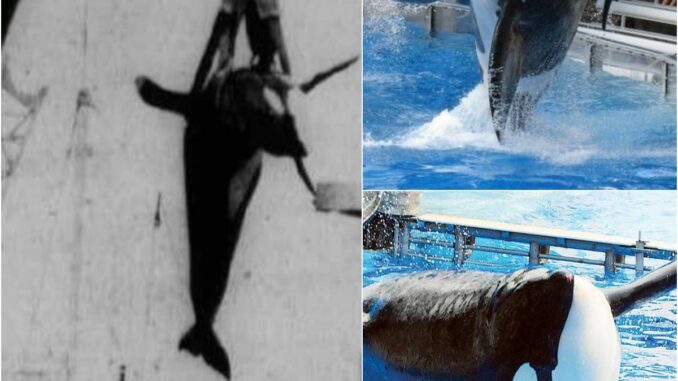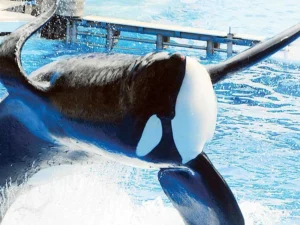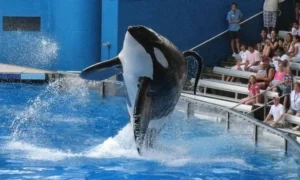
In a story that has sent shockwaves through the global animal rights community, the life of Keto, a male orca at Loro Parque in Tenerife, Spain, stands as a stark reminder of the devastating consequences of marine captivity. Captured from the wild and confined to a concrete tank for human entertainment, Keto’s life was marked by tragedy, culminating in the fatal attack on his trainer, Daniel Burch, in 2009. His story, coupled with fierce condemnation from organizations like PETA, has reignited the debate over the ethics of keeping orcas in captivity. Why do these majestic creatures, known for their gentle nature in the wild, turn violent in captivity? Let’s delve into Keto’s heartbreaking journey and explore the broader implications of marine parks, a topic that demands our attention as we reconsider humanity’s relationship with wildlife.

The Tragic Life of Keto
Keto’s life is a poignant example of the toll captivity takes on orcas, highly intelligent and social creatures built for vast ocean expanses. Born in the wild, likely in the waters off Iceland, Keto was torn from his natural habitat at a young age and thrust into the artificial world of marine parks. His story, from capture to his untimely death, is a cascade of suffering that highlights the cruelty of confinement.
Captured from the Wild
Keto’s life began in the open ocean, where orcas thrive in tight-knit pods, hunting cooperatively and swimming up to 100 miles a day. Likely captured in the early 1990s, when Iceland was a hub for orca captures, Keto was separated from his family and shipped to a marine park, possibly SeaWorld in the United States, before being transferred to Loro Parque in Tenerife. This traumatic separation stripped him of his natural social bonds, a loss that would shape his behavior for the rest of his life.
Life in a Concrete Cage
At Loro Parque, Keto was confined to a tank measuring just a fraction of the ocean’s expanse—equivalent to a human living in a bathtub. Orcas in the wild engage in complex behaviors like hunting, socializing, and exploring, but Keto’s world was reduced to repetitive performances and limited interaction. The lack of space, stimulation, and social structure led to chronic stress, a common issue for captive orcas. Studies from the Humane Society indicate that orcas in captivity often suffer from shortened lifespans, dental damage from chewing on tank walls, and psychological distress, all of which were evident in Keto’s life.
Descent into Violence
In captivity, Keto displayed increasing signs of aggression, a stark contrast to the gentle, cooperative nature of orcas in the wild. He was involved in altercations with other orcas at Loro Parque, a facility criticized for housing incompatible animals together. The cramped conditions and unnatural diet—frozen fish instead of live prey—further exacerbated his stress. This aggression culminated in the tragic incident on December 24, 2009, when Keto attacked and killed his trainer, Daniel Burch, during a rehearsal for a Christmas show. According to World Animal Protection, Keto dragged Burch underwater, leading to his death from drowning and blunt force trauma. The incident shocked the public and intensified scrutiny on marine parks.

An Untimely Death
Keto’s life ended in 2021 at the age of 20, far short of the 50-80 years male orcas typically live in the wild. His death, likely due to health complications linked to captivity, underscored the physical toll of confinement. Orcas in marine parks often suffer from infections, organ failure, and weakened immune systems, conditions rarely seen in their wild counterparts. Keto’s passing was not just the end of a life but a symbol of the systemic failures of the marine entertainment industry.
PETA’s Response: A Call for Change
The tragedy of Keto’s life and the death of Daniel Burch sparked a fierce response from PETA (People for the Ethical Treatment of Animals), an organization long critical of marine captivity. PETA’s reaction was swift and uncompromising, using Keto’s story to amplify their campaign against marine parks.
Condemning Captivity
PETA labeled the conditions at Loro Parque and similar facilities as “cruel and inhumane,” arguing that confining orcas to small tanks is akin to psychological torture. They pointed to Keto’s aggressive behavior as a direct result of his unnatural environment, noting that orcas in the wild rarely exhibit violence toward humans. PETA’s statement following Burch’s death emphasized that “captivity drives these intelligent animals to desperation,” leading to tragedies that could be avoided by ending marine captivity.
Demanding an End to Marine Parks
PETA has called for the complete cessation of orca captivity for entertainment purposes, advocating for the transfer of captive orcas to coastal sanctuaries where they can live in environments closer to their natural habitat. These sanctuaries, like the one proposed by the Whale Sanctuary Project, offer larger, ocean-based enclosures that allow orcas to engage in natural behaviors without the stress of performing. PETA argues that such facilities are the only ethical solution for animals like Keto, whose lives are irreparably damaged by captivity.
Holding Parks Accountable
PETA has repeatedly targeted Loro Parque and its partner, SeaWorld, accusing them of prioritizing profit over animal welfare. They demanded accountability for Burch’s death, arguing that marine parks bear responsibility for creating the conditions that lead to such incidents. PETA’s campaigns, amplified through social media and documentaries like Blackfish, have fueled public outrage, contributing to declining attendance at marine parks and policy changes, such as SeaWorld’s 2016 decision to end its orca breeding program.
Nature vs. Nurture: The Behavioral Divide
The stark contrast between Keto’s violent behavior in captivity and the peaceful nature of orcas in the wild lies at the heart of this tragedy. In their natural habitat, orcas are known for their intelligence, complex social structures, and lack of aggression toward humans. Pods of orcas work collaboratively to hunt, communicate through intricate vocalizations, and maintain lifelong family bonds. There has never been a recorded fatal attack by a wild orca on a human, a testament to their gentle disposition.
In captivity, however, orcas like Keto face conditions that are antithetical to their biology. Small tanks restrict their movement, artificial diets compromise their health, and isolation from natural pods disrupts their social instincts. These factors contribute to a phenomenon known as “captivity-induced psychosis,” where chronic stress manifests as aggression, depression, or self-harm. A 2017 study in the Journal of Veterinary Behavior found that captive orcas exhibit stereotypic behaviors—repetitive, purposeless actions like swimming in circles—indicating severe psychological distress. Keto’s attack on Daniel Burch was not an isolated incident but a symptom of a broken system that prioritizes entertainment over animal welfare.
The emotional weight of this contrast is profound. In the wild, Keto might have lived a long, fulfilling life surrounded by his pod, exploring vast oceans and engaging in natural behaviors. Instead, he spent his days in a concrete prison, his frustration boiling over into tragedy. This dichotomy forces us to question the morality of keeping such intelligent, sentient beings in captivity for our amusement.
Keto’s story is a heartbreaking reminder of the cost of marine captivity. From his capture in the wild to his violent outburst and premature death, his life encapsulates the suffering endured by orcas in marine parks. PETA’s fierce advocacy has amplified this tragedy, urging the world to rethink the ethics of confining these majestic creatures. The contrast between the gentle, social orcas of the wild and the distressed, aggressive animals in captivity is a powerful call to action. As we share Keto’s story on platforms like Facebook, let’s honor his memory by advocating for change—supporting sanctuaries, boycotting marine parks, and demanding a future where orcas swim free. The tragedy of Keto and Daniel Burch must not be in vain; it’s time to end the era of marine captivity and let these ocean giants return to their rightful home.